乡“双语”学习培训规划
双语学习训练工作计划

工作计划:________ 双语学习训练工作计划单位:______________________部门:______________________日期:______年_____月_____日第1 页共7 页双语学习训练工作计划根据自治区党委组织部新党组通字28号《关于进一步加强少数民族聚居地区乡镇干部“双语”学习培训工作的意见》,为进一步加强我县乡镇机关干部的“双语”工作能力,努力建设高素质乡镇干部队伍,结合实际,制定“双语”学习培训工作计划如下:一、“双语”培训工作的目的和意义少数民族地区汉族干部学习少数民族语言,少数民族干部学习汉语,是加强民族团结,促进各民族共同发展、繁荣和进步的重要举措,也是事关经济发展、社会稳定的大事。
开展乡干部“双语”培训工作,就是要通过“双语”学习,使少数民族干部能识读汉语资料,便于各族干部群众之间相互开展交流、增加沟通,进一步密切党群、干群关系,促进农村社会稳定,加快我县的社会主义新农村建设的步伐,促进各项工作的落实。
二、“双语”培训的目标任务“双语”学习培训以乡镇机关站所少数民族干部为重点。
培训时间从年11月份开始,拟定一次培训时间为两个月左右,今后每年,通过“双语”培训,使乡镇机关站所少数民族干部具备基本的“双语”能力,能阅读通俗的汉文资料。
三、“双语”培训的主要措施及步骤(一)运用多种培训方式,灵活组织培训。
主要采取脱产培训并结合自学方式进行。
脱产培训:主要针对乡镇机关站所的干部,参加县组织部按计划安排到我县委党校的“双语”培训班学习。
第 2 页共 7 页自学:针对所有乡镇干部。
我校对参加学习的干部学习“双语”提出具体要求,规定学习内容和要达到的效果,并把学习效果作为干部考核的内容。
四、培训效果的考核为确保学习培训效果,建立健全乡镇机关站所“双语”学习考核制度。
培训班结业前,都要进行考试,检验学习效果。
为切实促进乡干部学习“双语”的积极性,“双语”考核不合格者,并进行补学补考。
村民双语培训计划
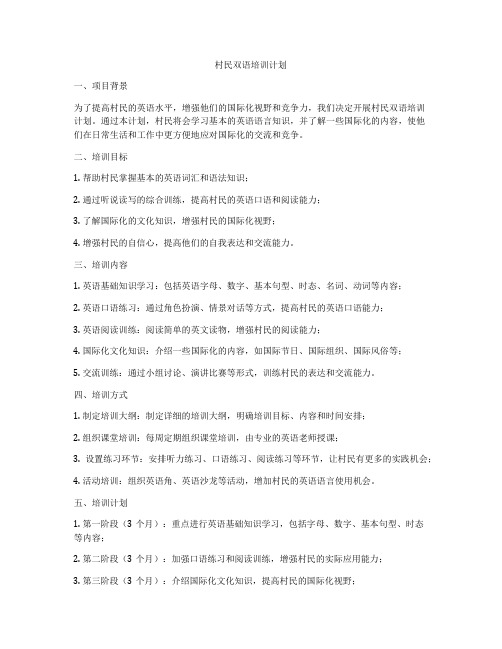
村民双语培训计划一、项目背景为了提高村民的英语水平,增强他们的国际化视野和竞争力,我们决定开展村民双语培训计划。
通过本计划,村民将会学习基本的英语语言知识,并了解一些国际化的内容,使他们在日常生活和工作中更方便地应对国际化的交流和竞争。
二、培训目标1. 帮助村民掌握基本的英语词汇和语法知识;2. 通过听说读写的综合训练,提高村民的英语口语和阅读能力;3. 了解国际化的文化知识,增强村民的国际化视野;4. 增强村民的自信心,提高他们的自我表达和交流能力。
三、培训内容1. 英语基础知识学习:包括英语字母、数字、基本句型、时态、名词、动词等内容;2. 英语口语练习:通过角色扮演、情景对话等方式,提高村民的英语口语能力;3. 英语阅读训练:阅读简单的英文读物,增强村民的阅读能力;4. 国际化文化知识:介绍一些国际化的内容,如国际节日、国际组织、国际风俗等;5. 交流训练:通过小组讨论、演讲比赛等形式,训练村民的表达和交流能力。
四、培训方式1. 制定培训大纲:制定详细的培训大纲,明确培训目标、内容和时间安排;2. 组织课堂培训:每周定期组织课堂培训,由专业的英语老师授课;3. 设置练习环节:安排听力练习、口语练习、阅读练习等环节,让村民有更多的实践机会;4. 活动培训:组织英语角、英语沙龙等活动,增加村民的英语语言使用机会。
五、培训计划1. 第一阶段(3个月):重点进行英语基础知识学习,包括字母、数字、基本句型、时态等内容;2. 第二阶段(3个月):加强口语练习和阅读训练,增强村民的实际应用能力;3. 第三阶段(3个月):介绍国际化文化知识,提高村民的国际化视野;4. 第四阶段(3个月):进行交流训练,增强村民的交流和表达能力。
六、培训评估1. 考核机制:每个阶段结束后进行考核,根据村民的学习情况进行评定;2. 考核内容:包括英语知识掌握情况、口语表达能力、阅读能力、国际化文化知识掌握情况等;3. 考核标准:根据考核结果,对村民进行评定,并给予奖励或补充培训。
双语培训学习工作计划范文(精选3篇)
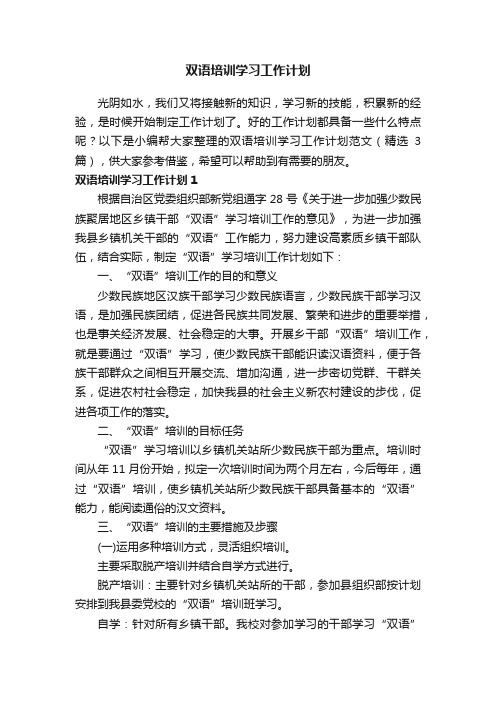
双语培训学习工作计划光阴如水,我们又将接触新的知识,学习新的技能,积累新的经验,是时候开始制定工作计划了。
好的工作计划都具备一些什么特点呢?以下是小编帮大家整理的双语培训学习工作计划范文(精选3篇),供大家参考借鉴,希望可以帮助到有需要的朋友。
双语培训学习工作计划1根据自治区党委组织部新党组通字28号《关于进一步加强少数民族聚居地区乡镇干部“双语”学习培训工作的意见》,为进一步加强我县乡镇机关干部的“双语”工作能力,努力建设高素质乡镇干部队伍,结合实际,制定“双语”学习培训工作计划如下:一、“双语”培训工作的目的和意义少数民族地区汉族干部学习少数民族语言,少数民族干部学习汉语,是加强民族团结,促进各民族共同发展、繁荣和进步的重要举措,也是事关经济发展、社会稳定的大事。
开展乡干部“双语”培训工作,就是要通过“双语”学习,使少数民族干部能识读汉语资料,便于各族干部群众之间相互开展交流、增加沟通,进一步密切党群、干群关系,促进农村社会稳定,加快我县的社会主义新农村建设的步伐,促进各项工作的落实。
二、“双语”培训的目标任务“双语”学习培训以乡镇机关站所少数民族干部为重点。
培训时间从年11月份开始,拟定一次培训时间为两个月左右,今后每年,通过“双语”培训,使乡镇机关站所少数民族干部具备基本的“双语”能力,能阅读通俗的汉文资料。
三、“双语”培训的主要措施及步骤(一)运用多种培训方式,灵活组织培训。
主要采取脱产培训并结合自学方式进行。
脱产培训:主要针对乡镇机关站所的干部,参加县组织部按计划安排到我县委党校的“双语”培训班学习。
自学:针对所有乡镇干部。
我校对参加学习的干部学习“双语”提出具体要求,规定学习内容和要达到的效果,并把学习效果作为干部考核的内容。
四、培训效果的考核为确保学习培训效果,建立健全乡镇机关站所“双语”学习考核制度。
培训班结业前,都要进行考试,检验学习效果。
为切实促进乡干部学习“双语”的积极性,“双语”考核不合格者,并进行补学补考。
双语学习训练工作计划范文

双语学习训练工作计划范文双语学习训练工作计划为了提高双语学习能力,我制定了以下工作计划:1. 制定学习目标:首先,我将明确我的学习目标。
我希望能够流利地听、说、读、写双语,并掌握一定的语法和词汇。
2. 制定学习计划:基于我的学习目标,我将制定一个具体的学习计划。
我计划每天花至少1小时进行双语学习,在周末和假期时增加学习时间。
3. 听力训练:为了提高听力能力,我将利用各种资源,如听力练习录音、双语电影和音频教材。
我会每天听一段双语对话,并尝试理解其中的内容。
4. 口语训练:我计划每周参加英语角或其他语言交流活动,与母语为英语的人进行对话。
我还会通过朗读和模仿他人的口语表达来提高自己的口语能力。
5. 阅读训练:我将阅读双语故事书、新闻文章和杂志,以提高阅读理解能力。
我会选择与自己兴趣相关的内容,以增加学习的动力。
6. 写作训练:为了提高写作能力,我将练习写双语日记、文章和邮件。
我会请教老师和朋友,以获取反馈并改进我的写作技巧。
7. 词汇和语法学习:我将每天学习一些新的词汇和语法规则。
我会使用双语词典和语法书籍,并结合实际语境进行练习。
8. 使用语言学习应用:我会下载一些双语学习应用程序,如Duolingo和HelloTalk,来帮助巩固所学知识,并与其他学习者进行交流和练习。
9. 参加语言考试:为了提高学习的动力和测量自己的进步,我计划参加一些双语考试,如雅思或托福。
10. 坚持和复习:最后,我会坚持每天学习,并定期复习所学内容,以保持所取得的进展。
这是我制定的双语学习训练工作计划。
通过执行这个计划,我相信我能够显著提高我的双语学习能力。
农村双语培训计划

农村双语培训计划IntroductionIn recent years, with the rapid development of the economy and the improvement of living standards, the demand for bilingual talents in rural areas has increased. However, due to the lack of resources and support, many rural areas are facing a shortage of qualified bilingual teachers and a lack of effective bilingual education programs. In order to address this issue, it is necessary to develop a comprehensive and targeted bilingual training plan for rural areas.Purpose of the Bilingual Training ProgramThe purpose of the bilingual training program is to provide rural areas with qualified bilingual teachers, to improve the quality and effectiveness of bilingual education, and to promote the development of bilingual talent in rural areas. The program will focus on providing teachers with the necessary knowledge and skills to teach bilingual classes, as well as providing support and resources to help schools establish and maintain effective bilingual education programs.Objectives of the Bilingual Training Program1. To train a new generation of bilingual teachers who are proficient in both Chinese and another minority language, and who possess the necessary teaching skills and knowledge to effectively teach bilingual classes in rural areas.2. To provide support and resources to schools in rural areas to help them establish and maintain effective bilingual education programs.3. To promote the development of bilingual talent in rural areas, and to improve the overall quality and effectiveness of bilingual education in rural areas.Key Components of the Bilingual Training ProgramThe bilingual training program will consist of several key components, including:1. Teacher Training: The program will provide intensive training for bilingual teachers, including courses in bilingual education theory and practice, language teaching methodology, and classroom management. The training will also include practical teaching experience and mentoring from experienced bilingual teachers.2. Curriculum Development: The program will provide support and resources to help schools develop and implement effective bilingual education programs, including the development of bilingual curriculum and teaching materials.3. Support for Schools: The program will provide support and resources to help schools establish and maintain effective bilingual education programs, including assistance withteacher recruitment, professional development, and the provision of teaching materials and resources.4. Community Engagement: The program will work to engage the local community in supporting and promoting bilingual education, including working with parents and community leaders to build support for bilingual education programs.Implementation of the Bilingual Training ProgramThe bilingual training program will be implemented in collaboration with local education authorities, schools, and other relevant stakeholders. The program will be designed to be flexible and adaptable to the specific needs and circumstances of each rural area, and will be customized to address the unique challenges and opportunities of each community.The program will be implemented in three phases:Phase 1: Needs Assessment and PlanningDuring this phase, a comprehensive needs assessment will be conducted to identify the specific needs and challenges of each rural area, and to develop a customized bilingual training plan for each community. The plan will include an analysis of the current state of bilingual education in the community, as well as an assessment of the resources and support needed to establish and maintain effective bilingual education programs.Phase 2: Teacher Training and Curriculum DevelopmentDuring this phase, bilingual teachers will receive intensive training in bilingual education theory and practice, language teaching methodology, and classroom management. The program will also provide support and resources to help schools develop and implement effective bilingual education programs, including the development of bilingual curriculum and teaching materials.Phase 3: Support and Community EngagementDuring this phase, the program will provide ongoing support and resources to help schools establish and maintain effective bilingual education programs, including assistance with teacher recruitment, professional development, and the provision of teaching materials and resources. The program will also work to engage the local community in supporting and promoting bilingual education, including working with parents and community leaders to build support for bilingual education programs.Evaluation and Monitoring of the Bilingual Training ProgramThe bilingual training program will be closely monitored and evaluated to ensure its effectiveness and impact. The program will be regularly evaluated through a combination of qualitative and quantitative methods, including surveys, interviews, and classroom observations. The results of the evaluations will be used to make ongoing improvementsand adjustments to the program, as well as to provide evidence of its impact and effectiveness.ConclusionThe development of a comprehensive and targeted bilingual training program for rural areas is essential to address the shortage of qualified bilingual teachers and the lack of effective bilingual education programs in rural areas. By providing intensive training for bilingual teachers, support and resources for schools, and promoting community engagement, the program will help improve the quality and effectiveness of bilingual education in rural areas, and promote the development of bilingual talent in these communities. With the implementation of the bilingual training program, it is hoped that more rural areas will be able to provide high-quality bilingual education, and that more bilingual talents will emerge in the rural areas.。
农村夜校双语培训计划
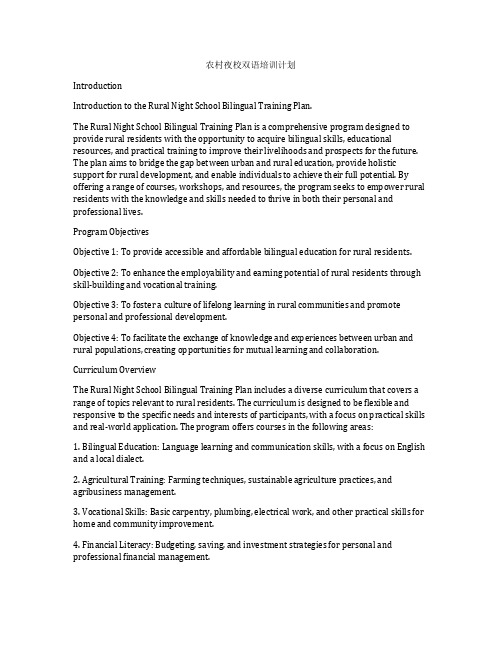
农村夜校双语培训计划IntroductionIntroduction to the Rural Night School Bilingual Training Plan.The Rural Night School Bilingual Training Plan is a comprehensive program designed to provide rural residents with the opportunity to acquire bilingual skills, educational resources, and practical training to improve their livelihoods and prospects for the future. The plan aims to bridge the gap between urban and rural education, provide holistic support for rural development, and enable individuals to achieve their full potential. By offering a range of courses, workshops, and resources, the program seeks to empower rural residents with the knowledge and skills needed to thrive in both their personal and professional lives.Program ObjectivesObjective 1: To provide accessible and affordable bilingual education for rural residents. Objective 2: To enhance the employability and earning potential of rural residents through skill-building and vocational training.Objective 3: To foster a culture of lifelong learning in rural communities and promote personal and professional development.Objective 4: To facilitate the exchange of knowledge and experiences between urban and rural populations, creating opportunities for mutual learning and collaboration. Curriculum OverviewThe Rural Night School Bilingual Training Plan includes a diverse curriculum that covers a range of topics relevant to rural residents. The curriculum is designed to be flexible and responsive to the specific needs and interests of participants, with a focus on practical skills and real-world application. The program offers courses in the following areas:1. Bilingual Education: Language learning and communication skills, with a focus on English and a local dialect.2. Agricultural Training: Farming techniques, sustainable agriculture practices, and agribusiness management.3. Vocational Skills: Basic carpentry, plumbing, electrical work, and other practical skills for home and community improvement.4. Financial Literacy: Budgeting, saving, and investment strategies for personal and professional financial management.5. Health and Wellness: Nutrition, hygiene, and preventive healthcare practices for individuals and families.6. Entrepreneurship and Small Business Management: Principles of business development and marketing, as well as support for small business start-ups.7. Technology and Digital Literacy: Basic computer skills, internet usage, and digital tools for communication and information access.Program StructureThe Rural Night School Bilingual Training Plan is delivered through a combination of in-person classes, workshops, and online resources. The program is designed to be accessible and inclusive, with an emphasis on accommodating the needs and schedules of rural residents.Classes are typically held in the evening to enable participation after working hours, and workshops and events are scheduled on weekends to accommodate those with family and community commitments. In addition, the program offers online resources and distance learning opportunities to ensure that participants can access educational materials and support regardless of their location or circumstances.Participants in the program are assigned a personal mentor who provides ongoing guidance and support throughout their learning journey. Mentors are trained educators and community members who are familiar with the specific needs and challenges of rural residents, providing personalized assistance and encouragement to help participants achieve their educational and professional goals.Community EngagementIn addition to the formal program curriculum, the Rural Night School Bilingual Training Plan includes a strong emphasis on community engagement and mutual support. Participants are encouraged to share their knowledge and experiences with other members of their community, fostering a culture of collaboration and collective learning.The program also facilitates networking and partnership opportunities with urban-based organizations, enabling participants to access resources and opportunities beyond their immediate community. By building bridges between rural and urban populations, the program aims to create a more inclusive and interconnected educational ecosystem that benefits all participants.Future OutlookThe Rural Night School Bilingual Training Plan has the potential to become a catalyst for positive change and development in rural communities. By empowering individuals with the knowledge and skills they need to thrive, the program can contribute to the overall well-being and prosperity of rural residents.Moreover, the program has the potential to foster greater understanding and collaboration between rural and urban populations, creating opportunities for shared growth and development. As the program expands and evolves, it has the capacity to become a model for inclusive, community-driven education and empowerment.ConclusionIn conclusion, the Rural Night School Bilingual Training Plan represents a comprehensive and innovative approach to addressing the education and training needs of rural residents. By offering accessible and practical bilingual education, skill-building opportunities, and community support, the program has the potential to make a meaningful and lasting impact on the lives of rural residents. As it continues to grow and evolve, the program has the capacity to create positive change in rural communities and contribute to the overall well-being and development of individuals and their families.。
农牧民双语夜校培训计划
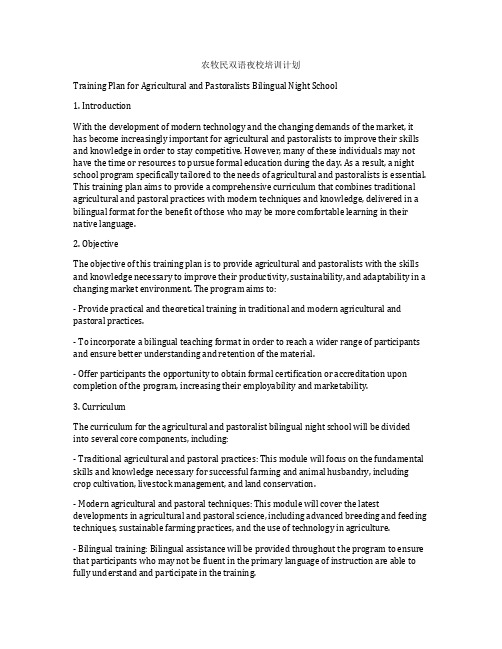
农牧民双语夜校培训计划Training Plan for Agricultural and Pastoralists Bilingual Night School1. IntroductionWith the development of modern technology and the changing demands of the market, it has become increasingly important for agricultural and pastoralists to improve their skills and knowledge in order to stay competitive. However, many of these individuals may not have the time or resources to pursue formal education during the day. As a result, a night school program specifically tailored to the needs of agricultural and pastoralists is essential. This training plan aims to provide a comprehensive curriculum that combines traditional agricultural and pastoral practices with modern techniques and knowledge, delivered in a bilingual format for the benefit of those who may be more comfortable learning in their native language.2. ObjectiveThe objective of this training plan is to provide agricultural and pastoralists with the skills and knowledge necessary to improve their productivity, sustainability, and adaptability in a changing market environment. The program aims to:- Provide practical and theoretical training in traditional and modern agricultural and pastoral practices.- To incorporate a bilingual teaching format in order to reach a wider range of participants and ensure better understanding and retention of the material.- Offer participants the opportunity to obtain formal certification or accreditation upon completion of the program, increasing their employability and marketability.3. CurriculumThe curriculum for the agricultural and pastoralist bilingual night school will be divided into several core components, including:- Traditional agricultural and pastoral practices: This module will focus on the fundamental skills and knowledge necessary for successful farming and animal husbandry, including crop cultivation, livestock management, and land conservation.- Modern agricultural and pastoral techniques: This module will cover the latest developments in agricultural and pastoral science, including advanced breeding and feeding techniques, sustainable farming practices, and the use of technology in agriculture.- Bilingual training: Bilingual assistance will be provided throughout the program to ensure that participants who may not be fluent in the primary language of instruction are able to fully understand and participate in the training.- Certification and accreditation: Participants will have the opportunity to obtain formal certification or accreditation upon completion of the program, demonstrating their proficiency in the skills and knowledge covered in the curriculum.4. Instructional MethodsThe instructional methods for the agricultural and pastoralists bilingual night school will be varied and adaptive, in order to accommodate the diverse needs and learning styles of the participants. A combination of traditional classroom instruction, practical fieldwork, and interactive workshops will be utilized to ensure a well-rounded educational experience. In addition, the program will leverage technology and multimedia resources to supplement the curriculum and provide participants with the most up-to-date information available.5. InstructorsInstructors for the agricultural and pastoralist bilingual night school will be chosen based on their expertise in the relevant fields, as well as their ability to effectively communicate and engage with a diverse group of participants. Bilingual instructors will be sought in order to ensure that all participants are able to fully comprehend and participate in the training program, regardless of their language proficiency.6. Duration and ScheduleThe agricultural and pastoralist bilingual night school program will be conducted over a period of six months, with classes held on weeknights to accommodate the schedules of the participants. The program will consist of a total of 60 sessions, each lasting for approximately 3 hours, with a mix of classroom and fieldwork instruction.7. Evaluation and AssessmentParticipants in the agricultural and pastoralist bilingual night school program will be evaluated and assessed on a regular basis, in order to gauge their progress and comprehension of the material. Both formal assessments, such as written exams and practical demonstrations, as well as informal feedback sessions, will be utilized to ensure that participants are able to apply the knowledge and skills they have acquired.8. Expected OutcomesUpon the successful completion of the agricultural and pastoralist bilingual night school program, participants can expect to:- Gain a comprehensive understanding of traditional and modern agricultural and pastoral practices.- Improve their productivity, sustainability, and adaptability in their respective fields.- Obtain formal certification or accreditation, increasing their employability and marketability.9. ConclusionThe agricultural and pastoralist bilingual night school program represents an opportunity to provide much-needed training and education to a group of individuals who may otherwise have limited access to formal learning opportunities. By combining traditional and modern agricultural and pastoral practices with bilingual instruction, this program aims to equip participants with the skills and knowledge necessary to thrive in a changing market environment. It is hoped that this training plan will serve as a model for similar initiatives targeted at marginalized communities in the future.。
基层双语培训计划
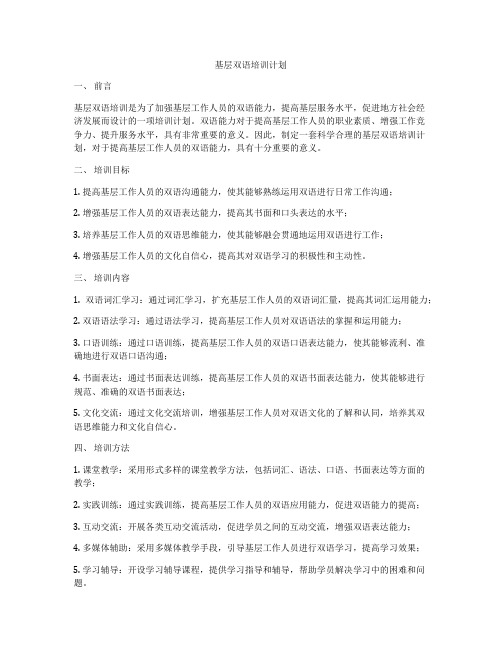
基层双语培训计划一、前言基层双语培训是为了加强基层工作人员的双语能力,提高基层服务水平,促进地方社会经济发展而设计的一项培训计划。
双语能力对于提高基层工作人员的职业素质、增强工作竞争力、提升服务水平,具有非常重要的意义。
因此,制定一套科学合理的基层双语培训计划,对于提高基层工作人员的双语能力,具有十分重要的意义。
二、培训目标1. 提高基层工作人员的双语沟通能力,使其能够熟练运用双语进行日常工作沟通;2. 增强基层工作人员的双语表达能力,提高其书面和口头表达的水平;3. 培养基层工作人员的双语思维能力,使其能够融会贯通地运用双语进行工作;4. 增强基层工作人员的文化自信心,提高其对双语学习的积极性和主动性。
三、培训内容1. 双语词汇学习:通过词汇学习,扩充基层工作人员的双语词汇量,提高其词汇运用能力;2. 双语语法学习:通过语法学习,提高基层工作人员对双语语法的掌握和运用能力;3. 口语训练:通过口语训练,提高基层工作人员的双语口语表达能力,使其能够流利、准确地进行双语口语沟通;4. 书面表达:通过书面表达训练,提高基层工作人员的双语书面表达能力,使其能够进行规范、准确的双语书面表达;5. 文化交流:通过文化交流培训,增强基层工作人员对双语文化的了解和认同,培养其双语思维能力和文化自信心。
四、培训方法1. 课堂教学:采用形式多样的课堂教学方法,包括词汇、语法、口语、书面表达等方面的教学;2. 实践训练:通过实践训练,提高基层工作人员的双语应用能力,促进双语能力的提高;3. 互动交流:开展各类互动交流活动,促进学员之间的互动交流,增强双语表达能力;4. 多媒体辅助:采用多媒体教学手段,引导基层工作人员进行双语学习,提高学习效果;5. 学习辅导:开设学习辅导课程,提供学习指导和辅导,帮助学员解决学习中的困难和问题。
五、培训保障1. 培训师资:选择经验丰富、业务能力强的双语培训师担任培训讲师;2. 培训设施:提供良好的培训场所和设施,保证培训的顺利进行;3. 学习材料:提供丰富的双语学习材料,包括教材、参考书、学习资料等;4. 学习环境:营造良好的学习环境,保障学员的学习积极性和学习效果;5. 后续支持:提供培训后续支持,建立学员学习档案,跟踪学习效果,定期进行复习和提高。
乡镇双语培训实施方案
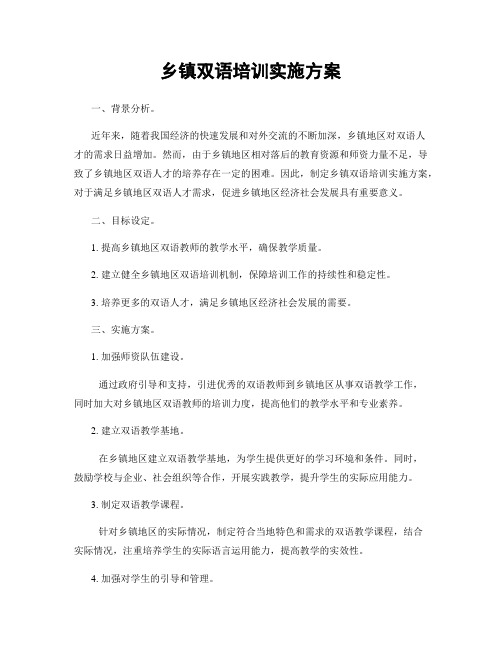
乡镇双语培训实施方案一、背景分析。
近年来,随着我国经济的快速发展和对外交流的不断加深,乡镇地区对双语人才的需求日益增加。
然而,由于乡镇地区相对落后的教育资源和师资力量不足,导致了乡镇地区双语人才的培养存在一定的困难。
因此,制定乡镇双语培训实施方案,对于满足乡镇地区双语人才需求,促进乡镇地区经济社会发展具有重要意义。
二、目标设定。
1. 提高乡镇地区双语教师的教学水平,确保教学质量。
2. 建立健全乡镇地区双语培训机制,保障培训工作的持续性和稳定性。
3. 培养更多的双语人才,满足乡镇地区经济社会发展的需要。
三、实施方案。
1. 加强师资队伍建设。
通过政府引导和支持,引进优秀的双语教师到乡镇地区从事双语教学工作,同时加大对乡镇地区双语教师的培训力度,提高他们的教学水平和专业素养。
2. 建立双语教学基地。
在乡镇地区建立双语教学基地,为学生提供更好的学习环境和条件。
同时,鼓励学校与企业、社会组织等合作,开展实践教学,提升学生的实际应用能力。
3. 制定双语教学课程。
针对乡镇地区的实际情况,制定符合当地特色和需求的双语教学课程,结合实际情况,注重培养学生的实际语言运用能力,提高教学的实效性。
4. 加强对学生的引导和管理。
通过学校、家庭和社会等多方合作,加强对学生的双语学习引导和管理,培养学生的自主学习能力和良好的学习习惯,确保双语教学工作的顺利进行。
四、保障措施。
1. 政府支持。
政府应加大对乡镇地区双语教育的支持力度,增加教育投入,提供必要的经费和政策支持,保障双语教学工作的顺利进行。
2. 社会各界参与。
鼓励企业、社会组织等各界力量参与到乡镇双语培训工作中,提供资源支持和帮助,共同推动双语教学工作的开展。
3. 完善评估机制。
建立健全的双语教学评估机制,对教师和学生的教学效果进行评估,及时发现问题并加以解决,确保双语教学质量。
五、总结。
乡镇双语培训实施方案的制定和实施,对于提高乡镇地区双语教育质量,培养更多的双语人才,促进乡镇地区经济社会发展具有重要意义。
村级双语培训实施方案
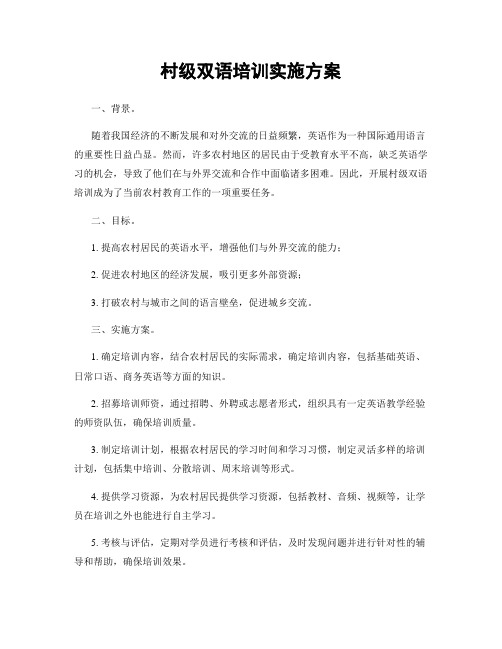
村级双语培训实施方案一、背景。
随着我国经济的不断发展和对外交流的日益频繁,英语作为一种国际通用语言的重要性日益凸显。
然而,许多农村地区的居民由于受教育水平不高,缺乏英语学习的机会,导致了他们在与外界交流和合作中面临诸多困难。
因此,开展村级双语培训成为了当前农村教育工作的一项重要任务。
二、目标。
1. 提高农村居民的英语水平,增强他们与外界交流的能力;2. 促进农村地区的经济发展,吸引更多外部资源;3. 打破农村与城市之间的语言壁垒,促进城乡交流。
三、实施方案。
1. 确定培训内容,结合农村居民的实际需求,确定培训内容,包括基础英语、日常口语、商务英语等方面的知识。
2. 招募培训师资,通过招聘、外聘或志愿者形式,组织具有一定英语教学经验的师资队伍,确保培训质量。
3. 制定培训计划,根据农村居民的学习时间和学习习惯,制定灵活多样的培训计划,包括集中培训、分散培训、周末培训等形式。
4. 提供学习资源,为农村居民提供学习资源,包括教材、音频、视频等,让学员在培训之外也能进行自主学习。
5. 考核与评估,定期对学员进行考核和评估,及时发现问题并进行针对性的辅导和帮助,确保培训效果。
四、保障措施。
1. 资金保障,通过政府专项经费、社会捐助等途径,确保培训经费的到位。
2. 资源支持,充分利用现有的教育资源,如学校、图书馆等,为培训提供场地和设备支持。
3. 政策支持,制定相关政策,对参与培训的师资和学员给予一定的政策支持,激励更多人参与到双语培训中来。
五、预期效果。
1. 农村居民的英语水平得到提高,增强了他们的交流能力和竞争力;2. 农村地区的经济发展得到推动,吸引了更多外部资源和投资;3. 农村居民与城市居民之间的交流更加便利,促进了城乡一体化发展。
六、总结。
村级双语培训实施方案的推行,将有助于提高农村居民的综合素质,促进农村地区的经济社会发展,实现城乡教育资源的均衡配置,推动我国教育事业的全面发展。
希望各级政府、社会各界和相关部门能够共同支持和配合,共同推动村级双语培训工作的顺利实施。
小学双语培训计划

小学双语培训计划一、培训目标:1. 帮助学生建立牢固的英语基础,提高听说读写能力;2. 提高学生的双语应用能力,使他们能够在日常生活和学习中自如地运用英语;3. 培养学生学习英语的兴趣和自信心,激发他们的学习动力。
二、培训内容:1.英语听力培训a. 听音辨识:通过听音辨识活动,训练学生的听力敏感度,提高他们的语音辨识能力;b. 听力理解:通过听短文、对话等训练,提高学生的听力理解能力,培养语感。
2.英语口语培训a. 口语练习:通过口语练习活动,让学生学会正确发音,掌握语音节奏和语音语调;b. 对话练习:通过角色扮演、情景对话等活动,培养学生的口语表达能力,提高他们的口语交际能力。
3.英语阅读培训a. 阅读训练:通过短文阅读、课外阅读等活动,提高学生的阅读能力,培养他们的阅读兴趣;b. 阅读理解:通过阅读理解训练,锻炼学生的理解能力和思维能力,提高他们的阅读水平。
4.英语写作培训a. 写作训练:通过写作练习,让学生掌握书面表达的基本技巧,提高他们的写作能力;b. 作文写作:通过作文训练,培养学生的想象力和表达能力,提高他们的写作水平。
5.双语应用培训a. 双语交流:通过双语交流活动,使学生在日常生活中习惯使用英语,提高他们的双语应用能力;b. 双语课堂:通过双语课堂教学,让学生在学习中接触到更多的英语内容,提高他们的双语能力。
三、培训方式:1.小班教学:每班不超过20人,保证每个学生都能得到老师的重点关注和指导;2.多媒体教学:利用多媒体教学仪器,给学生展示更生动、生活化的英语学习内容;3.互动教学:通过学生之间的互动,增加学习的趣味性和有效性;4.游戏教学:通过游戏教学的方式,让学生轻松愉快地学习英语。
四、培训计划:1.第一阶段:英语基础培训(1-2年级)a. 听力、口语培训:培养学生的英语听说能力,让他们熟悉英语语音和语调;b. 阅读、写作培训:让学生逐步掌握英语书写规范和基本句型,培养他们的英语书面表达能力;c. 双语应用培训:让学生在学习中逐渐接触到双语环境,自然地学会使用英语。
双语学习与培训工作计划
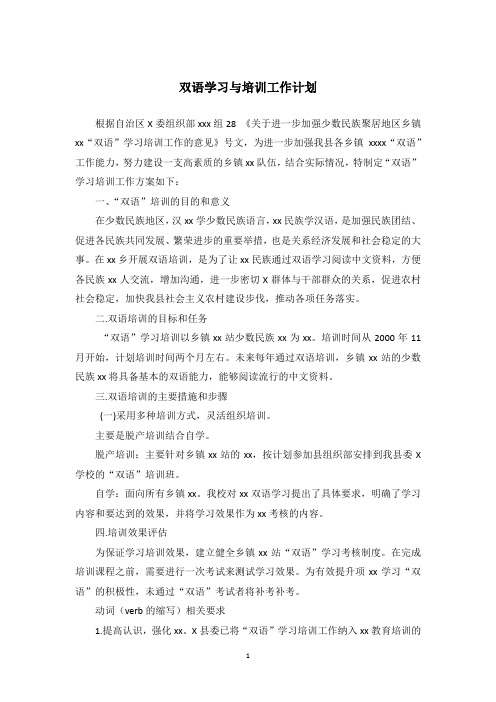
双语学习与培训工作计划根据自治区X委组织部xxx组28 《关于进一步加强少数民族聚居地区乡镇xx“双语”学习培训工作的意见》号文,为进一步加强我县各乡镇xxxx“双语”工作能力,努力建设一支高素质的乡镇xx队伍,结合实际情况,特制定“双语”学习培训工作方案如下:一、“双语”培训的目的和意义在少数民族地区,汉xx学少数民族语言,xx民族学汉语,是加强民族团结、促进各民族共同发展、繁荣进步的重要举措,也是关系经济发展和社会稳定的大事。
在xx乡开展双语培训,是为了让xx民族通过双语学习阅读中文资料,方便各民族xx人交流,增加沟通,进一步密切X群体与干部群众的关系,促进农村社会稳定,加快我县社会主义农村建设步伐,推动各项任务落实。
二.双语培训的目标和任务“双语”学习培训以乡镇xx站少数民族xx为xx。
培训时间从2000年11月开始,计划培训时间两个月左右。
未来每年通过双语培训,乡镇xx站的少数民族xx将具备基本的双语能力,能够阅读流行的中文资料。
三.双语培训的主要措施和步骤(一)采用多种培训方式,灵活组织培训。
主要是脱产培训结合自学。
脱产培训:主要针对乡镇xx站的xx,按计划参加县组织部安排到我县委X 学校的“双语”培训班。
自学:面向所有乡镇xx。
我校对xx双语学习提出了具体要求,明确了学习内容和要达到的效果,并将学习效果作为xx考核的内容。
四.培训效果评估为保证学习培训效果,建立健全乡镇xx站“双语”学习考核制度。
在完成培训课程之前,需要进行一次考试来测试学习效果。
为有效提升项xx学习“双语”的积极性,未通过“双语”考试者将补考补考。
动词(verb的缩写)相关要求1.提高认识,强化xx。
X县委已将“双语”学习培训工作纳入xx教育培训的重要内容,与其他工作有着相同的要求、部署和落实。
统一思想,提高对双语培训必要性和重要性的认识,坚持以人为本,树立科学发展观,把双语教育培训列入重要工作日程。
每次培训都要有专人组织和管理,使培训和学习能够严格有序地进行。
村国双语培训计划
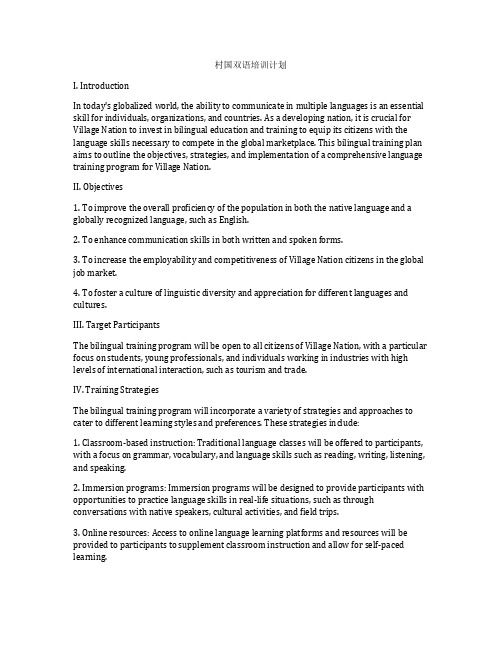
村国双语培训计划I. IntroductionIn today's globalized world, the ability to communicate in multiple languages is an essential skill for individuals, organizations, and countries. As a developing nation, it is crucial for Village Nation to invest in bilingual education and training to equip its citizens with the language skills necessary to compete in the global marketplace. This bilingual training plan aims to outline the objectives, strategies, and implementation of a comprehensive language training program for Village Nation.II. Objectives1. To improve the overall proficiency of the population in both the native language and a globally recognized language, such as English.2. To enhance communication skills in both written and spoken forms.3. To increase the employability and competitiveness of Village Nation citizens in the global job market.4. To foster a culture of linguistic diversity and appreciation for different languages and cultures.III. Target ParticipantsThe bilingual training program will be open to all citizens of Village Nation, with a particular focus on students, young professionals, and individuals working in industries with high levels of international interaction, such as tourism and trade.IV. Training StrategiesThe bilingual training program will incorporate a variety of strategies and approaches to cater to different learning styles and preferences. These strategies include:1. Classroom-based instruction: Traditional language classes will be offered to participants, with a focus on grammar, vocabulary, and language skills such as reading, writing, listening, and speaking.2. Immersion programs: Immersion programs will be designed to provide participants with opportunities to practice language skills in real-life situations, such as through conversations with native speakers, cultural activities, and field trips.3. Online resources: Access to online language learning platforms and resources will be provided to participants to supplement classroom instruction and allow for self-paced learning.4. Language exchange programs: Participants will be encouraged to engage in language exchange programs with native speakers of the target language, providing them with opportunities for real-world language practice and cultural exchange.V. CurriculumThe curriculum for the bilingual training program will be designed to gradually build participants' language skills from basic to advanced levels. The curriculum will include the following components:1. Basic language skills: Introduction to the target language, including basic word vocabulary, grammar rules, and simple conversational phrases.2. Intermediate language skills: Expansion of vocabulary, introduction to more complex grammar structures, and development of reading and writing skills.3. Advanced language skills: Mastery of advanced grammar, vocabulary, and language proficiency for professional and academic purposes.VI. ImplementationThe implementation of the bilingual training program will involve the following steps: 1. Needs assessment: A thorough assessment will be conducted to identify the language proficiency levels of the population and the specific language needs of different groups. 2. Resource allocation: Adequate funding, staffing, and material resources will be allocated to support the implementation of the training program.3. Program promotion: A comprehensive marketing and promotional campaign will be launched to raise awareness of the training program and attract participants.4. Partnership building: Collaboration with educational institutions, language learning centers, and international organizations will be sought to enhance the quality and scope of the program.VII. EvaluationThe effectiveness of the bilingual training program will be evaluated through a variety of measures, including:1. Pre- and post-training language proficiency tests: Participants' language skills will be assessed before and after the training program to measure improvement.2. Participant feedback: Regular feedback will be collected from participants to identify areas for improvement and to gauge satisfaction with the program.3. Employer feedback: Employers of program participants will be surveyed to assess the impact of the training program on their employees' language skills and job performance.VIII. ConclusionThe implementation of a comprehensive bilingual training program is essential for the development and competitiveness of Village Nation in the global arena. By equipping its citizens with the necessary language skills, Village Nation will be better positioned to engage in international trade, tourism, and other forms of global interaction. This bilingual training plan outlines the objectives, strategies, and implementation of a program that will benefit individuals, organizations, and the country as a whole.As Village Nation continues to invest in bilingual education and training, it will pave the way for a more prosperous and globally connected future.。
乡镇干部双语学习培训工作实施方案

乡镇干部双语学习培训工作实施方案***双语学习培训工作实施方案为切实加强党的基层组织建设,不断提高基层干部自身素质和必须具备的基本能力,强化各族干部学习双语的意识和抓好双语的责任,增进民族团结,有效掌握民情民意,维护社会稳定。
现结合实际,制定《**乡干部双语学习培训工作实施方案》。
一、干部双语学习培训的目标任务以**岁以下在职国家干部为重点,力争用三年左右时间,使乡政府年轻在职国家干部都具备基本的双语能力:即汉族干部能够用少数民族语言与群众交流,少数民族干部能够熟练运用国家通用语言文字开展日常办公,与群众交流。
二、干部双语学习培训的主要措施成立双语学习领导小组由乡党委书记***、乡长***组长,对干部双语学习培训负总责,人大主席***、乡党委**、常务副乡长**任副组长,对干部双语学习培训负全责,其中,**克负责民族干部的双语学习培训与考核,**负责汉族干部的双语学习培训与考核。
领导小组下设办公室,办公室主任由乡党委副书记、常务副乡长**兼任,成员有*********准备学习资料少数民族干部准备《汉语水平考试教程》、《汉语日常会话500句》作为学习资料;汉族干部准备《基础维语》、《维吾尔语日常会话500句》作为学习资料。
制定双语学习培训工作实施方案乡双语学习领导小组办公室要从口语表达能力、读写能力两个方面,采取测试等方法搞好摸底调查工作,准确掌握每名干部的双语水平。
按照熟练掌握双语、程度一般、只懂语言不懂文字和既不懂文字又不懂语言四个层次,分级建立干部双语学习档案。
乡政府招聘工作人员也要参与到双语学习中来,与干部一同进行双语学习培训。
乡政府招聘工作人员不参加考核,但要认识并重视双语学习,为今后更好地开展工作打好基础。
抓好日常学习1.开展集中培训要把双语学习纳入在职干部理论学习,每周二、三、四利用晨会半小时学习双语,保证每月开展不少于两次的双语集中培训,集中培训由乡政府领导和精通双语的干部进行轮流授课教学。
双语学习培训计划
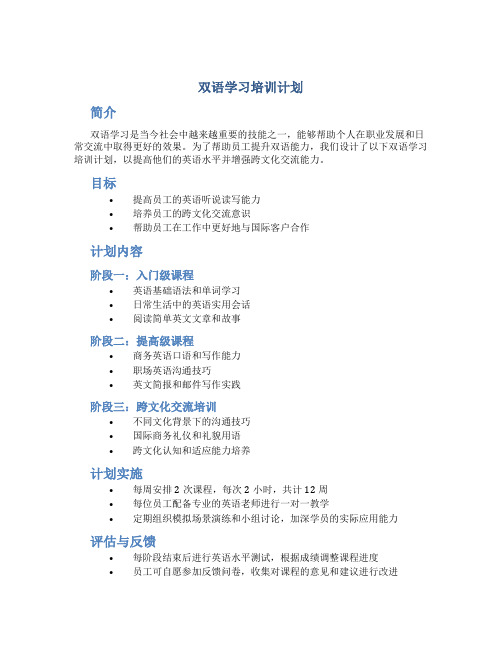
双语学习培训计划
简介
双语学习是当今社会中越来越重要的技能之一,能够帮助个人在职业发展和日常交流中取得更好的效果。
为了帮助员工提升双语能力,我们设计了以下双语学习培训计划,以提高他们的英语水平并增强跨文化交流能力。
目标
•提高员工的英语听说读写能力
•培养员工的跨文化交流意识
•帮助员工在工作中更好地与国际客户合作
计划内容
阶段一:入门级课程
•英语基础语法和单词学习
•日常生活中的英语实用会话
•阅读简单英文文章和故事
阶段二:提高级课程
•商务英语口语和写作能力
•职场英语沟通技巧
•英文简报和邮件写作实践
阶段三:跨文化交流培训
•不同文化背景下的沟通技巧
•国际商务礼仪和礼貌用语
•跨文化认知和适应能力培养
计划实施
•每周安排2次课程,每次2小时,共计12周
•每位员工配备专业的英语老师进行一对一教学
•定期组织模拟场景演练和小组讨论,加深学员的实际应用能力
评估与反馈
•每阶段结束后进行英语水平测试,根据成绩调整课程进度
•员工可自愿参加反馈问卷,收集对课程的意见和建议进行改进
结语
双语学习是一项需要持续努力的过程,通过本培训计划,我们希望能够帮助员
工在语言能力上得到提升,更好地适应国际化的工作环境,为企业的发展贡献力量。
希望每位员工都能够积极参与培训,不断挑战自己,提升自己的双语能力。
乡村双语培训计划
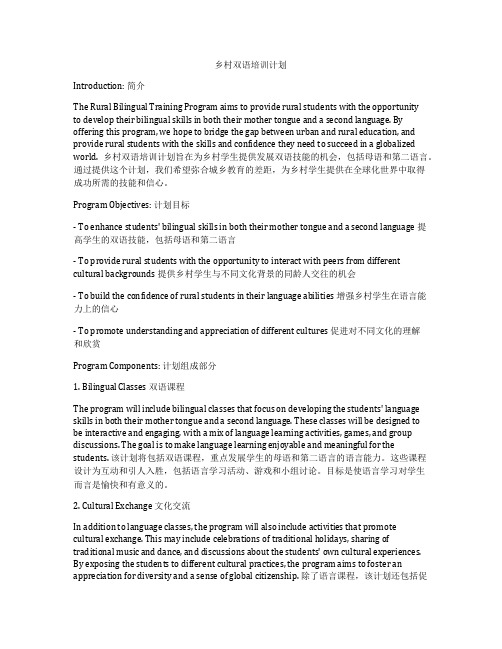
乡村双语培训计划Introduction: 简介The Rural Bilingual Training Program aims to provide rural students with the opportunityto develop their bilingual skills in both their mother tongue and a second language. By offering this program, we hope to bridge the gap between urban and rural education, and provide rural students with the skills and confidence they need to succeed in a globalized world. 乡村双语培训计划旨在为乡村学生提供发展双语技能的机会,包括母语和第二语言。
通过提供这个计划,我们希望弥合城乡教育的差距,为乡村学生提供在全球化世界中取得成功所需的技能和信心。
Program Objectives: 计划目标- To enhance students' bilingual skills in both their mother tongue and a second language 提高学生的双语技能,包括母语和第二语言- To provide rural students with the opportunity to interact with peers from different cultural backgrounds 提供乡村学生与不同文化背景的同龄人交往的机会- To build the confidence of rural students in their language abilities 增强乡村学生在语言能力上的信心- To promote understanding and appreciation of different cultures 促进对不同文化的理解和欣赏Program Components: 计划组成部分1. Bilingual Classes 双语课程The program will include bilingual classes that focus on developing the students' language skills in both their mother tongue and a second language. These classes will be designed to be interactive and engaging, with a mix of language learning activities, games, and group discussions. The goal is to make language learning enjoyable and meaningful for the students. 该计划将包括双语课程,重点发展学生的母语和第二语言的语言能力。
村双语培训计划
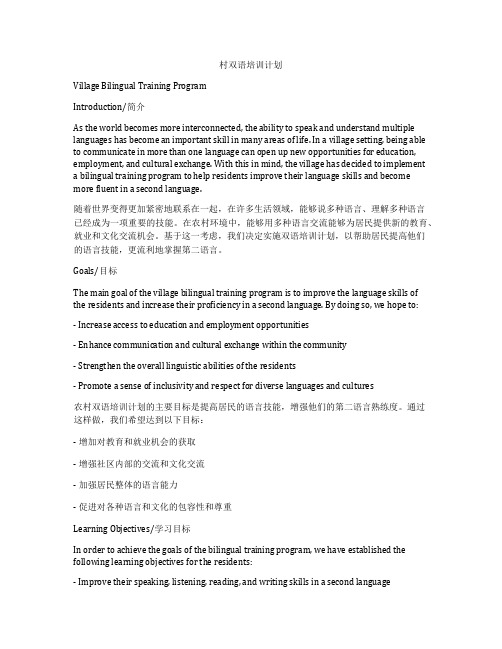
村双语培训计划Village Bilingual Training ProgramIntroduction/简介As the world becomes more interconnected, the ability to speak and understand multiple languages has become an important skill in many areas of life. In a village setting, being able to communicate in more than one language can open up new opportunities for education, employment, and cultural exchange. With this in mind, the village has decided to implement a bilingual training program to help residents improve their language skills and become more fluent in a second language.随着世界变得更加紧密地联系在一起,在许多生活领域,能够说多种语言、理解多种语言已经成为一项重要的技能。
在农村环境中,能够用多种语言交流能够为居民提供新的教育、就业和文化交流机会。
基于这一考虑,我们决定实施双语培训计划,以帮助居民提高他们的语言技能,更流利地掌握第二语言。
Goals/目标The main goal of the village bilingual training program is to improve the language skills of the residents and increase their proficiency in a second language. By doing so, we hope to:- Increase access to education and employment opportunities- Enhance communication and cultural exchange within the community- Strengthen the overall linguistic abilities of the residents- Promote a sense of inclusivity and respect for diverse languages and cultures农村双语培训计划的主要目标是提高居民的语言技能,增强他们的第二语言熟练度。
基层干部双语学习培训工作实施方案

文档来源为:从网络收集整修word版本可编辑欢迎下载支持.基层干部"双语”学习培训工作实施方案根据自治区党委组织部《关于进一步加强少数民族聚居地区乡镇干部“双语”学习培训工作的意见》(新党组通字[2007]28号)精神,为进一步加强我县基层干部的"双语" 培训工作,努力建设一支观念新、能力强、素质高的新型基层干部队伍。
结合我县实际,现就做好我县基层干部"双语" 培训工作制定以下实施方案。
一、基层干部“双语”培训工作的重要性“双语”是汉族与少数民族之间交流的媒介、沟通的桥梁、联系的纽带。
少数民族聚居地区的基层干部学习掌握"双语",对于宣传党的各项方针政策,维护社会政治大局稳定,提升基层组织建设整体水平,意义重大而深远。
加强“双语" 培训工作,是少数民族地区提高工作效率,加强自身建设的需要,有利于基层干部更好的宣传群众、组织群众和教育群众,有助于进一步密切党群、干群关系,有助于少数民族干部进一步掌握和领会党和国家的各项路线、方针和政策,有助于各族干部之间相互交流工作、增强沟通,有助于增进民族团结,促进农村社会稳定,是加快社会主义新农村建设的重要举措,对实现我县全面建设小康社会的宏伟目标具有十分重要的意义。
二、基层干部"双语”学习的目标要求文档来源为:从网络收集整理word版本可编辑.欢迎下载支掾从2009年至2010年,通过分期分批培训,使乡镇(场)机关、站所、社区干部的“双语"能力都能达到自治区规定的要求,即在乡镇干部的汉族干部能熟练地运用维吾尔语言进行工作和生活的交流,少数民族干部能熟练地掌握并运用汉语言文字进行工作和生活的交流,并能阅读汉文文件和报刊,具备一定的汉文书写能力。
具体要求:1、听的能力:要听懂〃双语〃日常工作、学习、生活用语;2.说的能力:必须掌握2000个以上常用词,满足日常生活、社会交际和一定范围的工作需要,民汉干部之间能够直接交流,能够用"双语"安排和总结工作;3.阅读能力:民族干部能给阅读汉文报刊、文件、工作计划、总结和日常生活、社会交际、学习及工作相关内容。
农村双语夜校培训计划
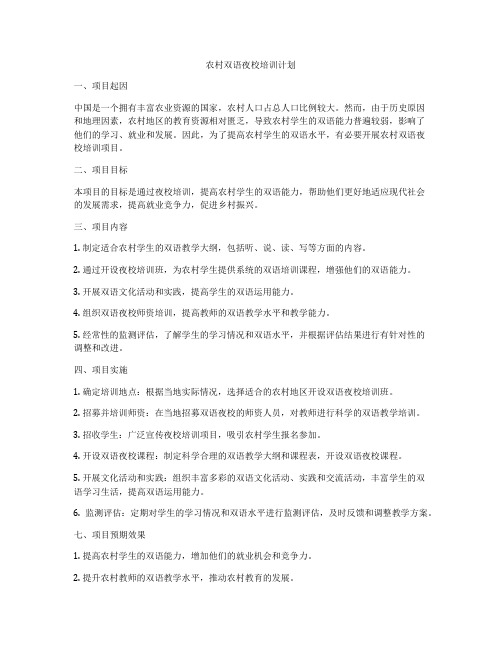
农村双语夜校培训计划一、项目起因中国是一个拥有丰富农业资源的国家,农村人口占总人口比例较大。
然而,由于历史原因和地理因素,农村地区的教育资源相对匮乏,导致农村学生的双语能力普遍较弱,影响了他们的学习、就业和发展。
因此,为了提高农村学生的双语水平,有必要开展农村双语夜校培训项目。
二、项目目标本项目的目标是通过夜校培训,提高农村学生的双语能力,帮助他们更好地适应现代社会的发展需求,提高就业竞争力,促进乡村振兴。
三、项目内容1. 制定适合农村学生的双语教学大纲,包括听、说、读、写等方面的内容。
2. 通过开设夜校培训班,为农村学生提供系统的双语培训课程,增强他们的双语能力。
3. 开展双语文化活动和实践,提高学生的双语运用能力。
4. 组织双语夜校师资培训,提高教师的双语教学水平和教学能力。
5. 经常性的监测评估,了解学生的学习情况和双语水平,并根据评估结果进行有针对性的调整和改进。
四、项目实施1. 确定培训地点:根据当地实际情况,选择适合的农村地区开设双语夜校培训班。
2. 招募并培训师资:在当地招募双语夜校的师资人员,对教师进行科学的双语教学培训。
3. 招收学生:广泛宣传夜校培训项目,吸引农村学生报名参加。
4. 开设双语夜校课程:制定科学合理的双语教学大纲和课程表,开设双语夜校课程。
5. 开展文化活动和实践:组织丰富多彩的双语文化活动、实践和交流活动,丰富学生的双语学习生活,提高双语运用能力。
6. 监测评估:定期对学生的学习情况和双语水平进行监测评估,及时反馈和调整教学方案。
七、项目预期效果1. 提高农村学生的双语能力,增加他们的就业机会和竞争力。
2. 提升农村教师的双语教学水平,推动农村教育的发展。
3. 促进农村双语教育的普及和发展,推动乡村振兴。
八、项目风险与对策1. 招生不足:加大宣传力度,吸引更多学生参与。
2. 师资短缺:加强培训力度,提高师资的双语教学水平。
3. 没有固定的培训场所:积极协调当地政府和学校,争取固定的培训场所。
- 1、下载文档前请自行甄别文档内容的完整性,平台不提供额外的编辑、内容补充、找答案等附加服务。
- 2、"仅部分预览"的文档,不可在线预览部分如存在完整性等问题,可反馈申请退款(可完整预览的文档不适用该条件!)。
- 3、如文档侵犯您的权益,请联系客服反馈,我们会尽快为您处理(人工客服工作时间:9:00-18:30)。
庙乡党发【2011】54号
昌吉市庙尔沟乡2011—2012年干部“双语"学习
培训规划
为认真贯彻落实州、市党委工作要求,全面加强我市干部“双语”学习培训工作,进一步统筹规划,明确目标,强化措施,稳步推进,根据中共昌吉市委组织部文件精神,特制定本规划。
一、充分认识加强干部“双语"学习培训工作的重要性,进一步增强做好干部“双语”学习培训工作的责任感和紧迫感
“双语”是汉族与少数民族之间交流的媒介、沟通的桥梁、联系的纽带。
认真抓好干部“双语”学习培训工作,不仅是各族干部不断提高自身素质、宣传党的方针政策、扎实开展群众工作、有效掌控社情动态、及时化解矛盾纠纷、维护社会政治大局稳定必须具备的基本能力,也是提高党的执政能力、加强我乡基层组织建设的重要举措,对于全乡党组织和领导干部带领各族群众认真做好保增长、保民生、保稳定的各项工作,具有十分重要和深远的意义。
最近,州、市党委再一次明确提出,基层干部“双语”学习培训工作,各级党委不抓不行,基层干部不学不行。
因此,一定要进一步把思想认识统一到州、
市党委的部署上来,增强责任感和使命感,下大力气,把全乡干部“双语”工作抓紧抓实,抓出成效。
二、2011—2012年干部“双语"学习培训工作的总体目标和主要任务
(一)总体目标
结合深入学习实践科学发展观活动,利用2年时间,采取脱产培训、在岗学习、实践锻炼、个人自学等多种形式,对全乡4 5岁以下的乡机关、各站所(包括直属站所)、各村干部(包括选聘到村任职的大学生) 进行“双语”学习培训。
到2012年,重点参学部门都必须具备基本的“双语”能力,即汉族干部能够用当地少数民族语言与群众直接交流;少数民族干部能够阅读通俗的汉文资料,具备一般的汉文字书写能力。
(二)主要任务
根据“双语”培训的总体目标,今后一个时期要把“双语”基础知识学习作为培训的首要任务,要通过市、乡党校举办“双语”脱产培训班,各村、各站所组织集中学习培训,干部进行个人自学等学习培训渠道,全面加强广大干部的“双语”能力,要通过培训使广大干部“双语”能力有明显提高。
三、实现目标任务的具体措施
(一)突出重点,整体推进,切实加强干部“双语”学习培训。
按照“分级分类、重点培训、注重实效”的原则,全方位、多渠道、多途径地开展干部“双语”学习培训。
两年内要保证全乡4 5岁以下干部至少轮训一遍,汉族干部累计参加党校等培训基地脱产培训的时间不少于2个月,民族干部累计参加脱产学习培训的时间不少于1个月。
1、乡正职领导干部。
突出抓好党政正职的“双语”学习培训带头作用,以市党校为培训主阵地,采取脱产培训形式,分期分批进行培训。
2、一般干部。
重点加强全乡副科级干部的“双语”学习培训,以市、乡党校为培训主阵地,以脱产培训和日常学习为主要形式,对本乡4 5岁以下干部进行“双语”学习培训。
乡党校举办阿什里乡汉族干部脱产“双语”培训班2期,重点培训我乡汉族副科级干部和后备干部,培训人数为15名;以乡机关、各站所、各村培训场所为主阵地,以集中培训和日常学习为主要渠道。
将“双语”学习与集中培训和日常学习紧密结合,每期培训班每天至少安排2个学时的“双语”内容,参学干部累计“双语”培训时间不少于两个月,两年内对干部全部轮训一遍。
(二)加强培训基地建设,为干部“双语"培训提供有力保障
1、加强培训基地建设。
进一步加大乡党委党校培训阵地的投入力度,切实加强基础设施建设,增强办学实力,不断改善办学条件、提高办学水平。
在确定乡党校为“双语”培训中心阵地的基础上,充分发挥学校的资源,不断延伸培训阵地,形成工作合力。
乡机关、各站所和各村,在继续加强培训阵地建设得基础上,进一步推进整合培训资源工作,盘活现有资源,使培训资源得到合理配置和有效利用。
2、加强“双语”培训师资队伍建设。
按照素质优良、规模适当、结构合理、专兼结合的原则,加大“双语”培训师资建设的力度。
乡党校结合市委“双语”教育安排,将市委从教育部门抽调的3名优秀民族教师充实到“双语”教师队伍中,配强“双语”培训师资力量。
保障“双语”培训工作的顺利实施。
3、加大“双语”培训经费投入。
“双语”培训班领导小组要结合“双语”培训工作实际,研究解决“双语”培训经费不足的问题。
乡财政部门要把“双语”培训经费列入财政预算,专款专用,保证“双语"培训任务的完成。
各站所、各村要将“双语”培训经费列入干部教育培训经费之中,统筹规划,合理使用,保证“双语’’培训经费的落实。
(三)积极探索,勇于创新,切实提高“双语’’培训的质量
1、探索培训模式。
积极探索“双语”培训模式,切实提高“双语”培训的针对性、实效性和吸引力。
大力推行干部自学方式,配备专门的“双语”学习笔记,加强日常“双语”学习。
科学设置培训班次,不断完善课程设计和培训内容,灵活掌握参学人员“双语”水平,对基础较好、一般、较差的基层干部,分层次安排强化班、提高班、基础班培训,做到因人施教。
大力推广网络培训、远程教育、电化教育,提高“双语”培训教学和管理的信息化水平。
要充分利用现代远程教育网络,开展“网上双语课堂”,定期组织观看“双语”电教片,不断提高“双语”培训工作水平。
创新各种学用载体,大力开展“双语”知识竞赛、演讲比赛、文艺演出、书法比赛、板报评展、“每天掌握十个词组,每周掌握十个句子”等活动,增强教学的趣味性和实效性。
2、加强制度建设。
进一步完善“双语”培训工作制度体系,建立健全考核激励机制和监督约束机制,制定操作性强的干部“双语”水平考核办法,推行月考、季考、年考等模式,以考促学,同时,将“双语”水平考试成绩作为岗位调整、职称晋升、评先评优的重要条件。
建立完善警示、谈话、通报制度,对经过两年培训,“双语”仍然不过关的领导干部,进行降级、待岗培训等组织处理。
建立和完善干部学习档案,及时掌握干部学习状况和“双语”能力,为
干部使用和有计划地开展“双语”培训服务。
3、拓宽培训渠道。
积极拓展“双语”培训思路和模式,在脱产培训、集中学习培训、个人自学等方式的基础上,进一步拓展“双语”培训渠道,推行“干部帮扶计划”利用自身优势提高培训质量。
我乡是昌吉市唯一的哈萨克民族乡,全乡干部80%都能熟练使用“双语”对话和文字书写,利用此优势结合我乡实际,在“双语”培训班培训的同时,实行“干部帮扶计划”以2名哈族干部,帮扶1名汉族干部学习哈语,1名汉族干部指导2名哈族干部,强化汉语的会话和写作能力。
还要把干部“双语”学习培训与落实领导干部联系点制度、干部包村制度等工作结合起来,采取驻村蹲点、开展全程代办、进村入户访民等工作机制,引导干部在工作实践和直接服务群众中巩固、提高“双语”能力。
通过建立“双语”夜校、晨读日、学习周等,灵活机动的组织开展“双语”学习,促进学习经常化。
注重安排民汉干部同室办公和住宿,开展结对帮学,抓好相互交流学习。
鼓励干部自备听录设备和范读光碟,召开各种会议时,提倡少数民族干部用汉语发言,汉族干部用少数民族语言发言,不断及强化学习基础。
(四)加强组织领导,确保“双语”培训任务的顺利完成
乡党委要把“双语”培训工作作为一项战略性、基础性工作列入议事日程,及时研究解决重大问题。
要把“双语”培训工作作为加强基层组织建设得一项重要内容,统筹安排,整体部署。
党委主要领导要加强调查研究,及时掌握“双语”培训工作情况,解决“双语”培训工作中的困难和问题。
乡督察部门要充分发挥“总管”职能,负责对“双语”培训工作的统一领导和宏观管理,定期检查落实“双语”培训工作,年终进行全面检查和考核。
各站所、各村要按照分工,发挥各自优势,各负其责,抓好落实,要根据本规划的要求,结合各自实际,制定各自的干部“双语"培训规划,并认真组织实施。
二〇一一年四月五日。
